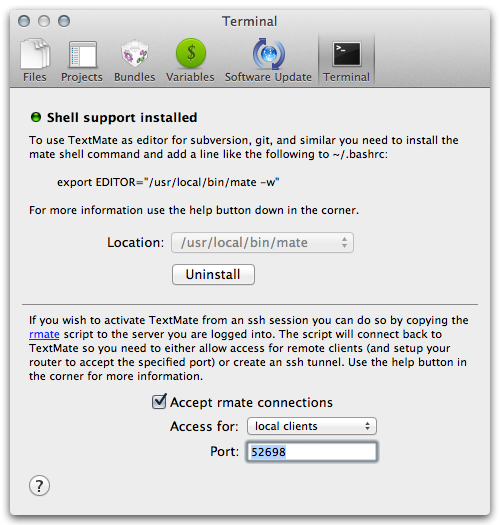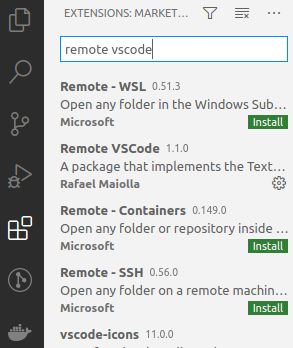https://github.com/aurora/rmate
Remote TextMate 2 implemented as shell script
https://github.com/aurora/rmate
bash rmate rsub shell sublime-text textmate unix
Last synced: 9 months ago
JSON representation
Remote TextMate 2 implemented as shell script
- Host: GitHub
- URL: https://github.com/aurora/rmate
- Owner: aurora
- License: gpl-3.0
- Created: 2011-12-17T16:04:29.000Z (about 14 years ago)
- Default Branch: master
- Last Pushed: 2023-02-28T19:22:26.000Z (almost 3 years ago)
- Last Synced: 2024-11-06T07:40:27.814Z (about 1 year ago)
- Topics: bash, rmate, rsub, shell, sublime-text, textmate, unix
- Language: Shell
- Homepage:
- Size: 173 KB
- Stars: 887
- Watchers: 35
- Forks: 123
- Open Issues: 6
-
Metadata Files:
- Readme: README.md
- License: COPYING.txt
Awesome Lists containing this project
README
# rmate
## Description
TextMate 2 adds a nice feature, where it is possible to edit files on a remote server
using a helper script. The original helper script provided with TM2 is implemented in
ruby. Here is my attempt to replace this ruby script with a shell script, because in
some cases a ruby installation might just be too much overhead for just editing remote
files.
This script can be used with some other editors (e.g. Sublime Text) via available plug-ins.
The shell script needs to be copied to the server, you want to remote edit files, on.
After that, you should set-up your editor to communicate with rmate.
### Quick install
```bash
sudo wget -O /usr/local/bin/rmate https://raw.githubusercontent.com/aurora/rmate/master/rmate
sudo chmod a+x /usr/local/bin/rmate
```
or with [bpkg](https://github.com/bpkg/bpkg)
```bash
bpkg install aurora/rmate
```
### Set-up editor
#### TextMate 2
Open your TM2 preferences and enable "Allow rmate connections" setting in
the "Terminal" settings and adjust the setting "Access for" according to your needs:

##### Local clients
It's a good idea to allow access only for local clients. In this case you need to open
a SSH connection to the system you want to edit a file on and specify a remote tunnel in
addition:
```bash
ssh -R 52698:localhost:52698 user@example.com
```
Or put the following lines in your local `~/.ssh/config`:
```ssh-conf
Host example.com
RemoteForward 52698 127.0.0.1:52698
```
If you are logged in on the remote system, you can now just execute
```bash
rmate test.txt
```
##### Remote clients
On some machines, where port forwarding is not possible, for example due to a missing ssh
daemon, you can allow access for "remote clients". Just ssh or telnet to the remote machine
and execute:
```bash
rmate -H textmate-host test.txt
```
#### Sublime Text
To use rmate with Sublime Text, you need to install a plug-in, e.g.
[rsub](https://github.com/henrikpersson/rsub)
or [RemoteSubl](https://github.com/randy3k/RemoteSubl).
You can install plug-ins via [Package Control](https://packagecontrol.io/).
[Install Package Control](https://packagecontrol.io/installation),
press `Cmd + Shift + P` for Mac and `Ctrl + Shift + P` for Linux/Windows,
select `Package Control: Install Package`,
and, finally, select `rsub` for rsub or `RemoteSubl` for RemoteSubl.
Also, you can install plug-ins manually.
* Linux
```bash
git clone https://github.com/henrikpersson/rsub ~/.config/sublime-text-3/Packages/rsub
git clone https://github.com/randy3k/RemoteSubl ~/.config/sublime-text-3/Packages/RemoteSubl
```
* Windows
```batch
git clone https://github.com/henrikpersson/rsub %APPDATA%/Sublime\ Text\ 3/Packages/rsub
git clone https://github.com/randy3k/RemoteSubl %APPDATA%/Sublime\ Text\ 3/Packages/RemoteSubl
```
* OS X
```bash
git clone https://github.com/henrikpersson/rsub ~/Library/Application\ Support/Sublime\ Text\ 3/Packages/rsub
git clone https://github.com/randy3k/RemoteSubl ~/Library/Application\ Support/Sublime\ Text\ 3/Packages/RemoteSubl
```
Then do the same things as described in [Local clients](#local-clients) part of this document.
#### VS Code
To use rmate with VS Code, you need to install an extension, e.g.
[Remote VSCode](https://marketplace.visualstudio.com/items?itemName=rafaelmaiolla.remote-vscode)

```json
//-------- Remote VSCode configuration --------
// Port number to use for connection.
"remote.port": 52698
// Launch the server on start up.
"remote.onstartup": true
// Address to listen on.
"remote.host": "127.0.0.1"
// If set to true, error for remote.port already in use won't be shown anymore.
"remote.dontShowPortAlreadyInUseError": false
```
Then do the same things as described in [Local clients](#local-clients) part of this document.
### Example
Example session: Editing html file located on an SGI o2:
## Requirements
A bash with compiled support for `/dev/tcp` is required. This is not the case on some
older linux distributions, like Ubuntu 9.x.
## Usage
Edit specified file
```console
$ ./rmate [arguments] [--] file-path
```
Read text from stdin
```console
$ echo "hello TextMate" | ./rmate [arguments] -
```
### Arguments
-H, --host HOST Connect to HOST. Use 'auto' to detect the host from SSH.
-p, --port PORT Port number to use for connection.
-w, --[no-]wait Wait for file to be closed by TextMate.
-l, --line LINE Place caret on line number after loading file.
+N Alias for --line, if N is a number (eg.: +5).
-m, --name NAME The display name shown in TextMate.
-t, --type TYPE Treat file as having specified type.
-n, --new Open in a new window (Sublime Text).
-f, --force Open even if file is not writable.
-v, --verbose Verbose logging messages.
-h, --help Display this usage information.
--version Show version and exit.
### Default parameter configuration
Some default parameters (`host` and `port`) can be configured by defining them
as the environment variables `RMATE_HOST` and `RMATE_PORT` or by putting them
in a configuration file. The configuration files loaded are `/etc/rmate.rc`
and `~/.rmate.rc`, e.g.:
```ini
host: auto # prefer host from SSH_CONNECTION over localhost
port: 52698
```
Alternative notation for configuration file is:
```ini
host=auto
port=52698
```
The precedence for setting the configuration is (higher precedence counts):
1. default (`localhost`, `52698`)
2. `/etc/rmate.rc`
3. `~/.rmate/rmate.rc`
4. `~/.rmate.rc`
5. environment variables (`RMATE\_HOST`, `RMATE\_PORT`)
## Disclaimer
Use with caution. This software may contain serious bugs. I can not be made responsible for
any damage the software may cause to your system or files.
## [License](COPYING.txt)
rmate
Copyright (C) 2011-present by Harald Lapp
This program is free software: you can redistribute it and/or modify it under the terms of the GNU General Public License as published by the Free Software Foundation, either version 3 of the License, or (at your option) any later version.
This program is distributed in the hope that it will be useful, but WITHOUT ANY WARRANTY; without even the implied warranty of MERCHANTABILITY or FITNESS FOR A PARTICULAR PURPOSE. See the GNU General Public License for more details.
You should have received a copy of the GNU General Public License along with this program. If not, see .